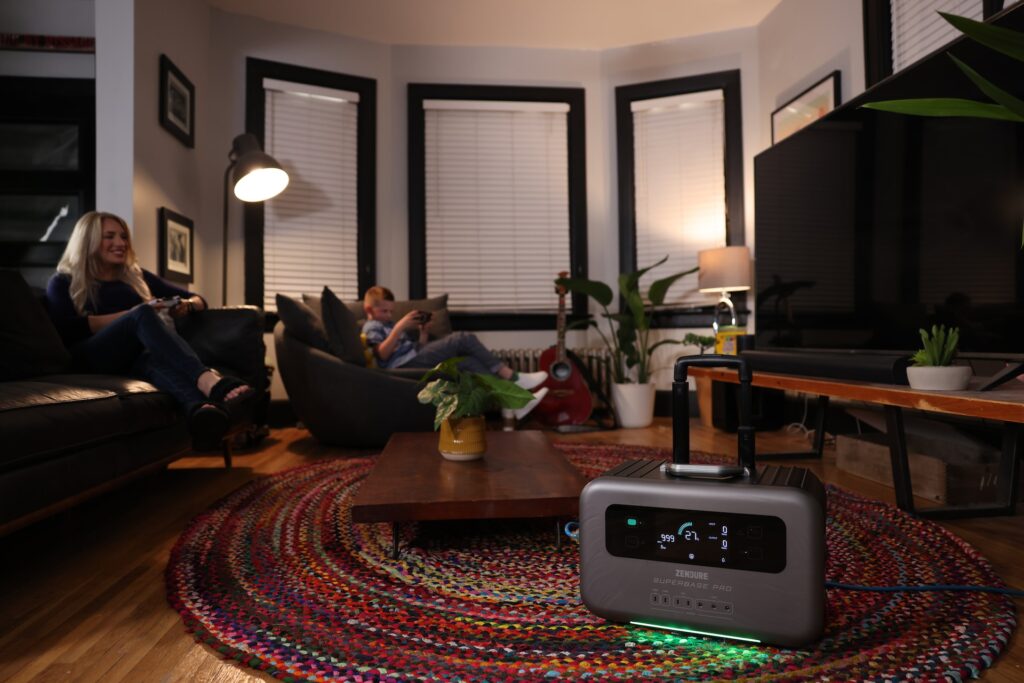What size generator do I need to run my house reliably during a power outage? A common question!
With the right portable or standby whole-house generator, you can keep the lights on and essential appliances running, even when the grid goes down.

In this comprehensive guide, we’ll walk through how to calculate your household’s electrical load and determine the perfect generator size. We’ll also provide tips for setup and key features to look for when shopping for the ideal home backup power unit.
Whether you experience frequent outages or just want emergency preparedness and peace of mind, sizing your generator properly is crucial. Let’s dive in!
Why Proper Generator Sizing Matters
Put simply – an undersized generator can’t handle the household electrical load. This could result in damaging voltage drops or the unit overheating when you need it most.
On the other hand, an oversized generator is just wasting capacity and money. The key is to choose the just right Goldilocks generator – adequately powerful for your needs without spending on unused wattage.
By taking the time to properly size your generator, you ensure:
- Appliances and devices function normally
- Sensitive electronics are protected
- Power is reliable whenever you need it
- Your investment is optimized for your home
- Electrical hazards like overloads are avoided
So where do you start in determining the right size? Let’s look at calculating your household power requirements.
How to Determine Your Home’s Electrical Needs
Choosing the generator wattage boils down to understanding your home’s energy usage. The steps include:
1. Inventory Essential Appliances
First, make a list of all the critical appliances and devices you want to run during an outage. This typically includes:
- Refrigerator – Keeps food cold and safe
- Lights – Essential for moving around safely
- Air conditioning – Provides comfortable cooling
- Electric oven – Allows cooking without gas
- Microwave – Heats food without a stove
- Well pump – Maintains water supply
- Security system – Provides home protection
Don’t forget smaller items like phone chargers, fans, your home internet router, TVs, and computers for news/communication.
2. Determine Startup and Running Watts
The next step is to note each appliance’s wattage requirements, which are usually listed on a label or manual. Pay attention to:
- Startup surge watts – Initial spike when first turned on
- Continuous running watts – Needed to operate once started
For example, your refrigerator may require 1500 surge watts but only 700 continuous watts. Your air conditioner could need 1,500 running watts but up to 4,000 surge watts when the compressor first kicks in.
3. Add Up the Total Wattage
With your list complete, add up the highest startup (“surge”) watt number for each essential appliance or device. This gives your estimated maximum power draw.
As a simplified example:
- Refrigerator surge – 1500 watts
- Lights total – 500 watts
- Furnace surge – 3000 watts
- TVs – 1000 watts
- Phone chargers – 100 watts
Total: 6100 watts
This starting point helps size your generator. Now let’s look at fine-tuning your home’s needs.
Electric Appliances And Their Wattage Consumption
Uncover the precise wattage by crafting this simple list, even if you’re facing challenges.
Essentials Appliances
| Appliances | Starting and Running Wattage |
| Washing Machine | 1,200/1,200 |
| Refrigerator or Freezer | 2,900/7,00 |
| Clothes Dryer | 6,750/5,400 |
| 2 Ton Central Ac | 8,750/3,800 |
| Electric Water Heater | 4,500/4,500 |
| Sum of Wattage | 24,100/15,600 |
A 24,100W generator is the ideal starting point, but if you’re looking to power only life’s necessities, opt for a minimum 25kW generator.
Powering the Entire House
| Appliances | Starting and Running Wattage |
| Garage door opener | 1,420/7,20 |
| Security system | 550/550 |
| Washing machine | 1,200/1,200 |
| Clothes Dryer | 6,570/5,400 |
| Refrigerator or Freezer | 2,900/700 |
| 2 Ton Central Ac | 8,750/3,800 |
| Electric water heater | 4,500/4,500 |
| Microwave oven | 1,300/1,300 |
| Electric range | 2,100/2,100 |
| 2 TV (46”) | 380/380 |
| Laptop | 250/250 |
| 8+ light fixtures | 1,100/1,100 |
| Sum of Wattage | 31,560/22,216 |
When faced with this situation, a 35kW generator for your entire home is probably a necessity.
Key Factors That Impact Generator Size
While your essential devices provide a baseline, other factors impact your ideal generator size.
Home Size
Larger homes with more devices and appliances require increased wattage capacity. A good rule of thumb is to allow for:
- 4000-8000 watts for a 2,000+ sq ft home
- 3000-5000 watts for 1,500-2,000 sq ft
- 2000-3500 watts for a 1,200 sq ft or smaller home
This accounts for higher AC, heating, and appliance demand.
Electrical Circuits
The number of connected circuits also influences generator watts. Powering more hardwired lighting, outlets, and appliances in place requires increased capacity versus just extension cords.
Device Efficiency
Updating to energy-efficient LED bulbs, newer appliances, and eco-friendly electronics reduces load. Similarly, using gas for heating, hot water, and cooking lowers electrical demand.
Power Backup Needs
What you aim to run influences size. Critical circuits only? Whole house coverage? Just periodic outages versus frequent storm-prone usage? Your runtime and usage need to impact capacity.
By incorporating these factors into your total, you can fine-tune the optimal generator size. Now let’s look at recommendations.
Generator Sizing Recommendations
While every home’s needs vary, here are some general guidelines on generator capacity for typical households:
For a 1,500 sq ft house – A 5,000-6,500 watt unit provides adequate power for lights, appliances, and some AC.
For a 2,000 sq ft house – Look for a 6,500-8,000 watt generator for full essential circuit coverage.
For a 2,500 sq ft house – An 8,000-10,000 watt unit is ideal for lighting, kitchen appliances, and nearly whole home coverage.
For a 3 bedroom house – Plan for 7,000-9,000 watts to comfortably run a 3 bedroom home’s essentials.
For a 1,200 sq ft house – A properly sized 3,500-5,000 watt generator will power small home basics.
These recommendations assume energy-efficient appliances and some gas utilities. Also, factor in any medical devices or electric vehicle charging needs.
Now let’s look at key features to consider when selecting your ideal home backup generator.
Key Generator Features for Homes
Once you settle on an appropriate power output, there are several generator design factors that ensure smooth operation and integration with your home:
Portable or Standby
Portable – Compact generators that are easy to maneuver and store. Require manual startup.
Standby – Permanently installed units that connect to a home’s electrical panel to automatically restore power during an outage.
Fuel Type
Gasoline – Most affordable and portable option. Requires proper fuel storage/rotation.
Propane – Convenient hookup to home tank. Long shelf life.
Diesel – Efficient and long-running. Needs fuel maintenance.
Natural Gas – No refueling needed. Must have existing home hookup.
Automatic Transfer Switch
This safely transfers power from the generator to home circuits when the main utility source is interrupted. Prevents backfeed.
Outlet Types
Different outlet types provide flexibility in directly powering appliances vs wiring into a home circuit panel.
Remote Monitoring
The smart interface provides status alerts and diagnostics to your smartphone for ease of maintenance.
Cold Weather Features
Upgraded batteries, oil warmers, and enclosures ensure smooth operation in cold climates.
Noise Level
Standby units are much quieter than most portables. Inverter models also notably reduced noise.
Connecting Your Generator to the Home Safely
Once you’ve purchased the properly sized generator for your needs, it must be connected and utilized safely. This involves:
- Using a manual transfer switch or automatic transfer switch installed by an electrician
- Attaching the generator to the transfer switch via heavy-duty, grounded extension cords
- Managing the electrical load to avoid overtaxing the generator capacity
- Ensuring proper generator grounding for safety
- Running the unit outdoors only to prevent deadly carbon monoxide buildup
Correct setup avoids back feed, overload hazards, and equipment damage. Check that your connections and wiring are rated to handle the power transfer.
Prioritizing Home Essentials
In a prolonged outage, you may need to be strategic about what gets powered. As fuel supplies dwindle, focus on powering only:
- The refrigerator/freezer to preserve food
- Critical medical devices for health needs
- Electronics and lighting as needed
- The furnace or specific rooms if temperatures drop
- Minimum outlets for charging essential electronics/batteries
By minimizing the electrical load to the absolute basics, you can stretch your limited generator runtime.
Generator Sizing FAQs
What size generator is needed for a 1,500 sq ft house?
A 5,000-6,500-watt generator is recommended for essential circuit coverage in a 1,500 sq ft home.
What size for a 2,000 sq ft house?
Look for a 6,500-8,000 watt unit for a 2,000 sq ft home’s electrical needs.
What size for a 2,500 sq ft house?
Target an 8,000-10,000 watt generator for adequate power in a 2,500 sq ft residence.
How many watts for a 3-bedroom house?
Plan for 7,000-9,000 watts to comfortably run a 3-bedroom home’s essential devices and appliances.
What size for a 1,200 sq ft house?
A properly sized 3,500-5,000 watt generator will handle small 1,200 sq ft home basics.
How many kW for an AC unit?
A 1.5-ton AC unit requires around 5 kW to start up and 2 kW of continuous running power.
Can a 4.5 KVA generator run AC?
Yes, a 4.5 kVA generator can comfortably handle the starting and running power of a 1 to 1.5-ton AC unit.
Will a 15 kW generator power a house?
Yes, a 15 kW generator provides ample power for operating essential circuits in most homes.
Will a 12,000-watt generator run a whole house?
A 12,000-watt unit can run a whole house as long as the total electrical load stays under this capacity.
Properly sizing your home backup generator provides peace of mind that you can maintain a comfortable refuge when grid power is lost.
By accurately calculating your home’s electrical needs and choosing a generator to match, you can rest easy knowing your essentials are covered in any outage situation.
Stay safe, and let us know if you have any other home generator questions!




